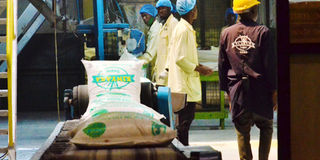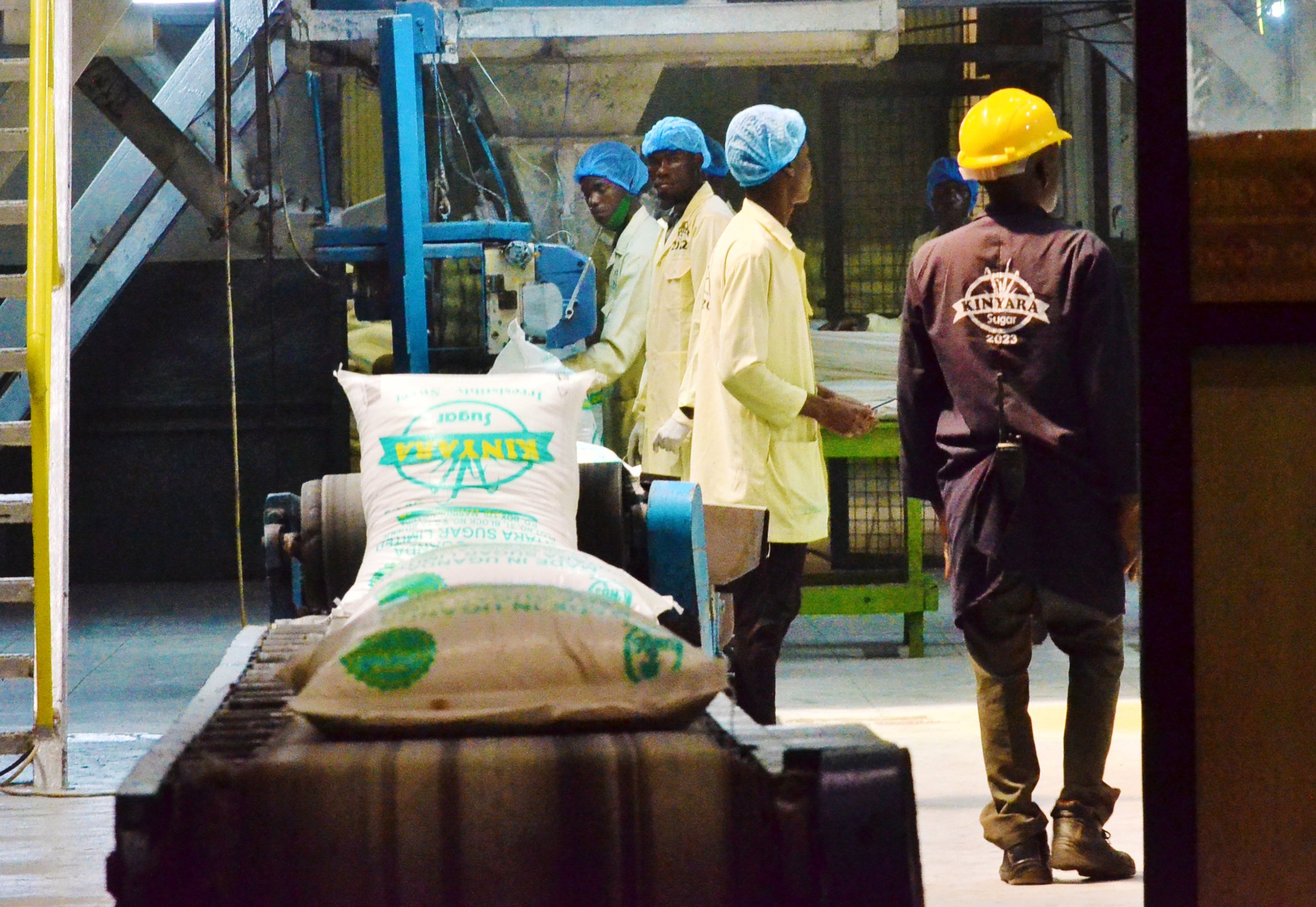Prime
Sugary drinks prices set to increase by 15%

Workers bag refined sugar at Kinyara Sugar in Masindi District last year. Kinyara Sugar is struggling to satisfy demand for industrial sugar. PHOTO/FILE.
What you need to know:
- The miller’s failure to quickly ramp up capacity to satisfy local demand has left managers of sugary drinks entities with no option but anticipating price increment on their products.
Kinyara Sugar’s failure to produce 75,000 tonnes of industrial sugar has left many of its clients complaining about late deliveries, rationing and quality challenges, Monitor can reveal.
The miller’s failure to quickly ramp up capacity to satisfy local demand has left managers of entities like Hariss International Limited, Coca-Cola Beverages Uganda (CCBU), Crown Beverages Limited (CBL) and Jesa Farm Dairy up in arms.
A fortnight ago, the dissatisfaction was palpable during a closed-door meeting Finance minister Matia Kasaija had with the Uganda Manufacturers’ Association (UMA).
Mr Kasaija was rapped for creating a shortage of industrial sugar by slapping a high duty on it to protect the domestic market for Kinyara Sugar.
The losses that companies are having to incur were painstakingly described at the meeting that Monitor gained access to.
Hariss International Limited, whose ready-to-consume products are traded under the Riham brand, previously enjoyed steady supplies but now gets about half of the requested amounts.
This has forced the company to, against its better wishes, lose production hours.
Besides, Jesa Farm Dairy’s yoghurt, which used to dominate the market, is slowly losing to competition from Kenya.
Monitor has been told that this is largely because Kinyara is yet to produce industrial sugar with the right enzymes for making yogurt.
No due diligence
Experts blame the government for the woes of the manufacturers for failing to carry out due diligence on the actual production capacity of Kinyara is responsible for the manufacturers’ woes.
While the government has been trying to promote industrialisation to wean the country off imports, the policy measure has plunged the country into a general lack of most inputs used in the industries on the domestic market.
“Over time, you would want those to be locally manufactured, but you want to build that capacity before you put a ban so that your industry, which is the core objective, is not disadvantaged,” Fred Muhumuza, a macroeconomist, said.
He proceeded to note that while Uganda wants to produce industrial sugar, the country should endeavour to have accurate statistics to know the actual demand and the qualities that people need.
He added: “We could have checked what Kinyara can put on the market and see how we can support Kinyara. Over time, the miller picks up capacity, we continue reducing on the imports. But we don’t block imports that Kinyara has said, ‘go and check the capacity they can do and do not undermine other industries.’”
Impact
Observers believe operating at half capacity could quickly hurt the industrialists. Such industrialists have in most cases procured all that raw materials except industrial sugar. The absence of industrial sugar, therefore, creates a stasis that translates into a nosedive in production. This limited supply in turn triggers price increases.
Once the cost of production for industrialists shoots through the roof, the net result is often job cuts. Muhumuza says ultimately, people looking from the outside will come to the conclusion that “Uganda’s policy making is very inconsistent and very unpredictable.” Investors, he adds, “hate uncertainty. If there is uncertainty in policy making, people will not be in Uganda.”
Already, some soda manufacturing companies are exploring the possibility of importing industrial sugar, which attracts 25 percent duty, to make up for shortage.
“Kinyara Sugar has done well to pioneer the production of industrial sugar, albeit with limited capacity,” one of the beverages manufacturers told Monitor before warning that the market should brace itself for a sharp increase in prices of locally produced sodas.
Monitor understands that the predicted price increment could be by 15 percent. This essentially means the price of soda, which has been stable at Shs1,000 for a 300ml bottle for many years, could shoot up to Shs1,500 ahead of the forthcoming festive season.
“The consumer is already hard pressed with high prices of fuel, food. The prices are up by all manners of reason. For us, we cannot stomach it because of tax policy. The machines have to keep running, we are trying to keep people in employment,” explained the manufacturer.
The manufacturer also fears that thousands of jobs in the soft drinks industry, put the number to anywhere between “3,000 to 4,000 people, could be laid off.”
Poaching
Kinyara Sugar said its struggles to produce enough industrial sugar can be traced to the loss of about 2,000 hectares of sugarcane through “poaching.” The cane lost, officials say, is equivalent to one month’s worth of crashing. This translates to Shs50 billion. We understand that contract farming—seen as an antidote to poaching—has only been maintained by Kinyara, Lugazi and Kakira.
The sugar companies invest in farmers in a bid to get some proceeds from the cane, which takes roughly 18 to 24 months to mature. It is, however, not uncommon for farmers to sell the cane to another company. This causes the original investor to lose out.
Consequently, the remaining players use high prices to replenish their supply of cane, a practice Uganda Sugar Manufacturers Association calls unsustainable. Besides distorting the market, it has—in part—been blamed for spiking a countrywide increment in brown sugar prices. A kilogramme of the same now retails at Shs6,000.
President Museveni has previously pitched zoning of cane growing, but lawmakers overwhelmingly voted against it on account of monopolies and their attendant effects of unfair prices taking root.
Mixed picture
While Kinyara’s installed annual sugar production capacity has reached 60,000 tonnes, it falls below the domestic demand as it translates to 15,000 tonnes per quarter, 5,000 tonnes per month and 230 per day.
Kinyara is benefiting from a monopolistic market condition as GM Sugar and Mayuge Sugar milling companies have taken a conscious investment approach, choosing to remain in the brown sugar milling business.
Increasing prices of brown sugar both on the local and global markets have forced the two firms to shelve their plans of investing in white sugar production even as they have licences.
On the domestic market, sugar prices have remained high due to shortage of mature sugar cane. As such, the sugar recovery rate remains low, thus industrialist report a sharp drop in production. The elevated brown sugar prices, which costs Shs4.1m ($1,100) per tonne, makes it more competitive compared to industrial sugar, which also costs the same amount.
While Kinyara has 60,000 tonnes installed capacity of white sugar production, capacity remains low—estimated slightly at over 26,230 tonnes in eight months ending September 2023. This sends signals of a conscious approach the investors have taken, even as the Ugandan white sugar market is estimated at Shs225b ($60m).





